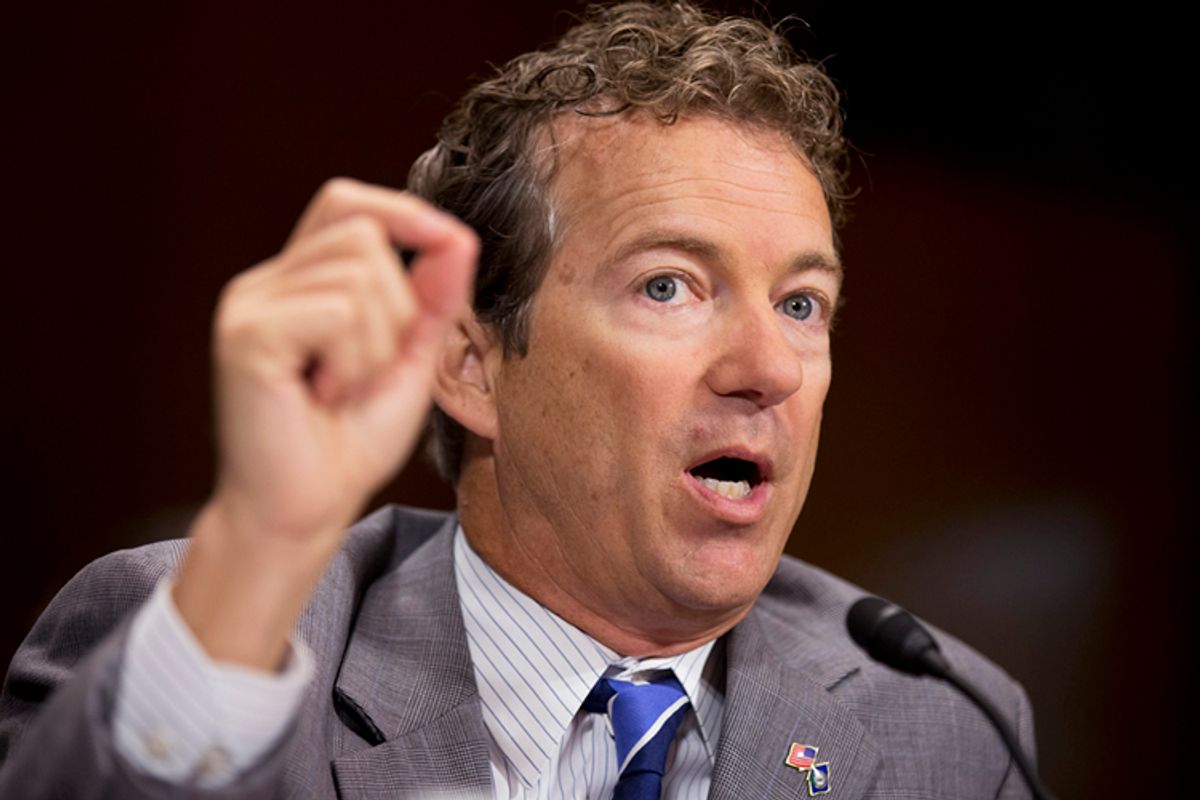 You could call it the wealthy white fratboy wing of the GOP. Or perhaps its masters-of-the-universe subset, as exemplified by Wall Streeters who regularly rank private profits above the common good and whose credo is “get government out of my way.”
You could call it the wealthy white fratboy wing of the GOP. Or perhaps its masters-of-the-universe subset, as exemplified by Wall Streeters who regularly rank private profits above the common good and whose credo is “get government out of my way.”
Libertarians make up a small but enduring slice of the Right, a nationwide studyby the Public Religion Research Institute confirms. Of course, they have their own party that nominates presidential candidates—like the Greens. But, practically speaking, libertarians line up with Republicans most of the time.
They are the economic conservatives and privacy rights adherents that existed before the Tea Party emerged in 2010, PRRI finds, and today—as in years past—they split with the religious right on regulating morality, and they are not always Tea Party fans.
PRRI’s “2013 American Values Survey” is the latest reminder from respected pollsters that “committed libertarians”—who comprise seven percent of all voters, with another 15 percent leaning their way—have an out-sized influence. Libertarians feel that there is almost nothing good that government can do for them personally or for society, PRRI reports. In contrast, the GOP’s evangelical wing wants government to ban abortion, reject same-sex marriage and bar assisted suicide for the terminally ill.
According to PRRI, a room full of libertarians would be overwhemingly young, male and white. “Nearly all libertarians are non-Hispanic whites (94 percent), more than two-thirds (68 percent) are men, and more than six in 10 (62 percent) are under the age of 50,” they report. Libertarians tend to be WASPs—white Anglo-Saxon Protestants (27 percent)—or religious agnostics (27 percent), but a few are Catholic (11 percent) and amazingly “no libertarians identify as black Protestant,” PRRI said, without offering an explanation.
It would one thing to dismiss libertarians as a fringe movement, as “only 12 percent of self-identified Republicans are libertarians, compared to 20 percent of Republicans who identify with the Tea Party, [or] 33 percent who identify with the religious right.” But with benefactors such as the Koch brothers channeling more than $250 million into the 2012 election for campaigns targeting Democrats and unions—and continuing today by leading attacks on Obamacare and trying todiscredit climate change—it is important to know what they believe and how they differ from others on the Right.
On economic issues and social safety nets, PRRI reports they are old-school economic conservatives. Two-thirds oppose raising the federal minimum wage, which now is $7.25 an hour. Nearly all (96 percent) have “an unfavorable view of the 2010 health law [Obamacare], compared with 83 percent of white evangelicals.” Seventy-three percent oppose stronger environmental laws.
Economic and religious conservatives have always occupied conflicting corners of the GOP—and that continues, as libertarians disagree with the religious right on culture war issues. “Nearly six-in-ten (57 percent) oppose making it more difficult for a woman to get an abortion, a proportion identical to the general population,” PRRI said. Seventy percent favor lethal injections by physicians for the terminally ill—nearly twice the rate of other Republicans. Seventy-one percent favor legalizing pot, compared to 59 percent of Tea Partiers. In contrast, 69 pecent of “white evangelical Protestants oppose legalizing marijuana,” PRRI found.
One area where libertarians are less liberal is LGBT issues—though they are more open-minded than much of the GOP. “While a majority (59 percent) of libertarians oppose same-sex marriage, they are significantly less opposed than Republicans overall (67 percent) and than other conservative-leaning groups such as Tea Party members (73 percent) and white evangelical Protestants (80 percent).”
When it comes to the intensity of their political beliefs, PPRI found that libertarians dislike Democrats more fervently than they like Republicans—who they have a hot-and-cold relationship with. Fifty-seven percent “have a favorable view” of the GOP, “but a substantial minority (40 percent) have an unfavorable view,” the survey said. That may be why they are less likely than Tea Partiers to vote in GOP primaries, PRRI found. When it comes to Democrats, 89 percent "have an unfavorable view" and 64 percent "have a very unfavorable opinion of the party."
Libertarians name Sen. Rand Paul as their first choice for the GOP’s 2016 presidential nominee, with Tea Party darlings Ted Cruz, Marco Rubio and Paul Ryan following in descending order. But the PRRI survey offers no explanation about why one candidate would be more popular than another. Of course, there is a Libertarian Party, which has nominated its own national candidates in the past, such as Texas congressman Ron Paul—Rand Paul’s dad.
On other issues, their platform includes a strong aversion to the government’s domestic spying, an isolationist foreign policy, and reluctance to use military force. On economic growth, they favor lower taxes and do not support public programs to help people get ahead. That survival-of-the-fittest, hands-off mindset includes opposing gun control laws, as well as censoring online pornography.
Libertarians tend to register to vote at a slightly higher rate (80 percent) than the national average (76 percent), PRRI found. And the survey finds that they follow politics more than most Americans. “Libertarians are much more likely than Americans overall to pay attention to what is going on in government and politics,” it said. “Fewer than four-in-ten (38 percent) Americans report paying attention… Among libertarians, a majority (56 percent) report that they pay attention to politics always or most of the time.”
Americans who identify as firm libertarians might only be seven percent of the electorate, but with some of the deepest pockets in America backing their beliefs—particularly on economic issues and the role of government—they remain an outsized political force. They certainly are an enduring part of the Republican Party, even if they have been eclipsed by Tea Partiers—such as during the recent government shutdown.

Shares